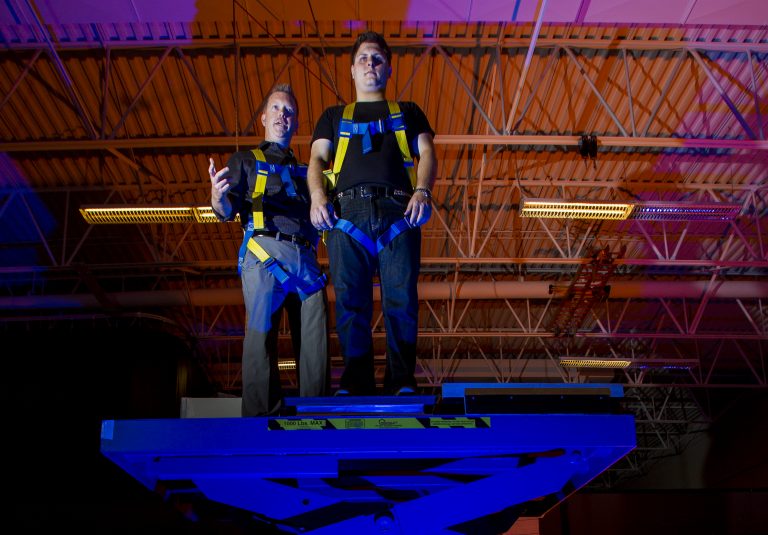
Dr. Mark Carpenter (left) demonstrating one of his studies at the Neural Control for Posture and Movement lab, UBC.
Research Excellence Clusters are networks of researchers spanning multiple disciplines at UBC who organize to solve key challenges facing society. These clusters transcend the traditional boundaries associated with departments, institutions, and funding agencies. And they are expected to target issues and engage in research that would not otherwise be possible.
The School of Kinesiology has several emerging and established clusters that include: the Origins of Balance Deficits and Falls, the Physical Activity for Precision Health Cluster, and the BC Diabetes Research Network. These are very exciting areas of interdisciplinary research that are providing innovative and valuable solutions with big impacts on the health and wellbeing of society.
In the next monthly newsletters we will share a series of articles informing you about fascinating areas of research undertaken by our faculty members. In this month’s issue we will shine a light on the School of Kinesiology’s research cluster known as The Origin of Balance Deficits and Falls. This research cluster focuses on falls and balance disorders as they have a profound influence on an individual’s quality of life and incur huge health and financial costs on Canadian society. As an example, one-third of people over the age of 65 will fall each year and of those that do fall, will fall repeatedly. As a result, falls have become the leading cause of accidental death and hospitalization in Canada. Fall-related injuries account for the highest proportion of healthcare costs in the country. In 2010 this was estimated at an astounding $8.7 billion per year in direct and indirect costs associated with fall related injuries.
Fear of Falling
Dr. Mark Carpenter, co-lead of this cluster, explains, “Our research cluster has developed one of the most comprehensive collections of cutting-edge balance measurement tools and techniques. It is unique because both the physiological and the psychological factors that contribute to balance problems and falls are examined. The psychological factors include the fear of falling which has been shown to greatly increase fall risk and can directly impact postural control even in otherwise healthy individuals. For example, imagine walking across a beam. If I put the beam on the floor most people could walk on it without falling. But if it is raised most people lose their balance and fall. So, our balance behaviour can come from perceived threat or the emotional context of the situation. We use this approach in our lab to see how fear can contribute to different aspects of balance control.
Employing Virtual Reality Technology
More recently Dr. Carpenter and his team have used virtual reality technology to put subjects in fearful or challenging environments that they couldn’t otherwise recreate in
the lab. So, they manipulate fear and anxiety and examine its direct effect on different elements of balance control. “With this approach we can understand which elements of balance problems are due to fear as opposed to an underlying pathology,” states Dr. Carpenter. Having this information may help inform different treatment approaches to prevent falls, because there may be an emotional component as well as a physical one. The cluster also uses a wide array of cutting-edge neurophysiological approaches to understand how the brain and sensory motor systems control healthy balance and contribute to different balance disorders.
Assisting Aging Populations
Dr. Carpenter explains, “We use motorized balance platforms that disturb balance in ways that mimic false situations
In real life – think of the tilt when standing on a boat. We then record the balance responses using different techniques such as sophisticated infrared motion analysis cameras to measure how your body moves in 3-dimensional space in response to that perturbation. We use electrodes to record the timing and amplitude of the muscle responses to prevent that fall. We are also using imaging techniques like EEG and MRI to understand the cortical and sub cortical areas in the brain that might be responsible for controlling balance and might lead to balance difficulties. In my lab we use these techniques to examine the underlying problems in aging populations, those suffering from spinal cord injury, from vestibular disfunction, from stroke, Parkinson’s disease and multiple sclerosis.”
The long-term objectives of this cluster’s research are to develop clinical balance screening tools, to identify potential fallers, and patients with balance disorders before a fall occurs, to identify the most effective physical activity programs and therapeutic interventions to reduce balance deficits and falls and to drive technological advances in the development of balance assisted devices and prosthetics to reduce the prevalence and reduce the risk of falls in high risk populations.
We invite you to learn more about this cluster and the research team that works with Dr. Carpenter: https://balancefalls.ubc.ca/